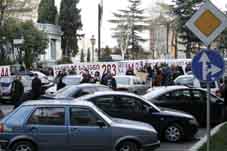Opposition bring in supporters from the regions
By Mzia Kupunia
Thursday, April 23

Speaking to demonstrators gathered in front of the Georgian Parliament building, one of the opposition leaders, Eka Beselia from the Movement for United Georgia led by former Defence Minister Irakli Okruashvili, said that “thousands of people will join the demonstration at this very important moment for Georgia.” “This will be the protest of not only Tbilisi residents, but the whole of Georgia,” Beselia said. She added that success is very near. “These highly organized and large-scale rallies will in several days end in victory,” Beselia said.
The opposition had reported during the day that the Government was trying to prevent opposition supporters entering Tbilisi. National Forum member Eldar Chapanidze, who was trying to enter Tbilisi from the town of Poti in Western Georgia, was assaulted by unidentified masked men at the village of Supsa, the National Forum Press Centre reported on April 22. “Four masked men beat our party member in front of the Patrol Police; however the policemen did not react at all,” Magda Popiashvili of the Press Centre said, adding that Chapanidze was taken to Poti hospital. National Forum members also said that on Tuesday night unknown people had damaged the tyres of their minibus in Batumi.
The Georgian Interior Minister denied having any link with these incidents. Speaking to the Kommersant newspaper, Minster Vano Merabishvili said the opposition is “lying”. “We do not hinder anyone. We do not need this. These demonstrations do not threaten the stability of the country,” Merabishvili said.
In his Kommersant interview Merabishvili noted that the majority of rally participants are former policemen and customs officers who were made jobless and thus left without the opportunity to take bribes. “These people can now earn their living by doing business, however they have lost their status and don’t like to see young boys filling their posts now. These people are still authoritative in the eyes of the public and they still influence public opinion,” Kommersant quoted the Georgian Interior Minister as saying.
At the rally Salome Zourabichvili, the leader of the Way of Georgia and one of the initiators of the protests, told demonstrators that the Georgian President and Government “don’t see the people.” “When you do not see your people and don’t hear anything they say, how can you speak to them?” Zourabichvili asked, adding that the President should hold a dialogue with the people, not the political parties.
Gia Tsagareisvhili from the Parliamentary faction Strong Georgia also joined the rally and said he would sit in one of the “cells” on Rustaveli Avenue. “This is the place where I should be now, as Georgia’s fate is being determined here, on Rustaveli,” he said, calling on other MPs to put aside their own private interests and join him in cell number 116. The opposition says 665 people have already registered their willingness to sit in the “cells”. Five people will be placed in each “cell”, the opposition activists say.
The influx of demonstrators from the regions will motivate Tbilisi residents to join the rallies as well, analysts say. Political commentator Shalva Pichkhadze said that as people from the regions are now joining in “there are no signs of the protest spirit decreasing.” Pichkhadze also commented on the statement of the Georgian Interior Minister about “the jobless and former policemen” forming the majority of demonstrators. “People who are discontented with the government are standing on Rustaveli Avenue. What exactly these people are discontent with is what the Government should find out,” Pichkhadze said. He added that it is impossible to predict if the opposition’s “victory is close” or not, saying that things are not that clear so far.
Pichkhadze said that conducting a referendum on whether to hold early Presidential elections could have been the best solution, and the opposition should have united around this idea because “it would not lose anything by it, and the Government would also find out what Georgian citizens thought.”
